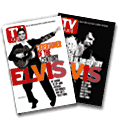Peter Guralnick, known for the two-pieced Elvis-biography (Last Train to Memphis & Careless Love) and the co-production with Ernst Jorgenson Day by Day, wrote an article for TV-Guide. The article tells perfectly why Elvis is Artist of the Century.
A hundred years. Thousands of entertainers. We struggled to choose the greatest. But in the end, as his acclaimed biographer Peter Guralnick makes clear, it had to be The King. Undeniably. Elvis Presley did not consciously set out to change history, and yet that is what he did. Today, nearly a quarter of a century after his death, he remains a larger-than-life figure, selling more records than most contemporary performers, his name instantly recognizable across every barrier of language and geography, his celebrity as great as any but the most universally recognized historical icons. He was a revolutionary whose influence has never waned.
And yet he has scarcely been given credit for his accomplishment, dismissed more often as a sideshow by the culture that he irrevocably changed, misunderstood as much for the intent of his message as for the content behind it. For Elvis Presley, far from being the agent of social destruction that he was originally perceived to be, believed so much in the promise of a democratic society that he brought to its center a vernacular language (the language of gospel music, the language of the blues, the rich language of the rural South, both black and white) whose existence had hitherto scarcely been recognized within the confines of "polite" society. This was Elvis Presley’s triumph: the triumph of the democratic dream. Even at the outset, he aspired to the kind of universality that in retrospect he has clearly achieved.
In 1956, at the age of 21, he dominated the world of popular entertainment. With five No. 1 hits he topped the national charts for nearly half the year, sold more records than anyone ever had, turned "Love Me Tender," the B Western in which he made his movie debut, into an enormous box-office hit and was watched by more than 80 percent of the viewing public in his first appearance on The Ed Sullivan Show in September. He was fresh, sexy and subversive, seen as the creator of a new style of music that was, whether you liked it or not, guaranteed to ensure him at least a sidebar in history.
But this was not how he saw himself. He saw the music that he loved as part of the mainstream; even at this frenzied peak of popular success he sought to establish an all-inclusive base, in which he could sing sophisticated ballads and jubilee spirituals, hillbilly laments and low-down blues. "I sing all kinds," he explained to Sam Phillips’s assistant, Marion Keisker, when he first entered Phillips’s Sun recording studio and sought to obliterate distinctions by embracing them.
That is what makes Elvis Presley truly revolutionary. Over the course of his entire career he refused to be limited by conventional considerations of region, class or generational appeal. Musically he ignored not just racial barriers but cultural ones as well, drawing on the works of everyone from Enrico Caruso to the Ink Spots, Jackie Wilson to Bing Crosby, the Soul Stirrers and the Statesmen to Bill Monroe and Big Bill Broonzy to forge a style that always declared itself to be his own.
"He was like a mirror," said Keisker of the 18-year-old Elvis she first encountered. "Whatever you were looking for, you were going to find in him. He had all the intricacy of the very simple." That remains no less true in our perception of Elvis today. It was not just the post office that had the problem of picking which Elvis the public might prefer; the public itself had long since registered its divided loyalties, with some maintaining strict allegiance to the ’50s rocker, others caught up in the emotionally scarred music of the ’70s, still others embracing the inescapable Elvis Is Everywhere symbolism of Elvis as a cultural joke.
For Elvis, of course, such choices did not exist. He reached more people than any entertainer in history by seeking to bridge the gulf between black and white, rich and poor, highbrow and lowbrow. He revolutionized our way of looking at things with a voice that can no more be categorized today than it could when he made his first Sun sides and a vision that was unwilling to accept anything less than the democratic ideal. And if on occasion we find ourselves losing sight of his music in the cacophony of voices that seek to define or explain, we need only take our example from Elvis himself and open ourselves up to the wealth of experience, the full spectrum of the American vernacular tradition that Elvis Presley sought to interpret and explore in all its manifest joys and sorrows.
TV-Guide Article
December 29, 1999 | Other
